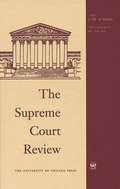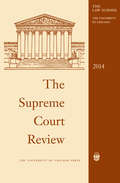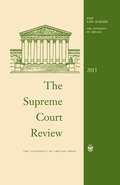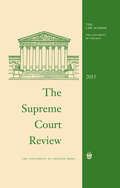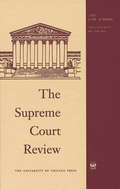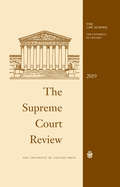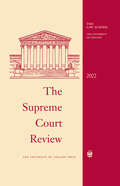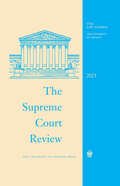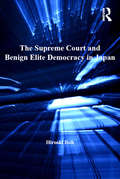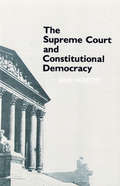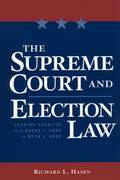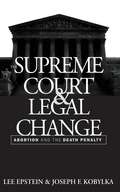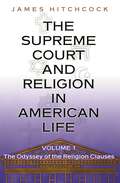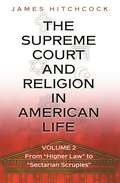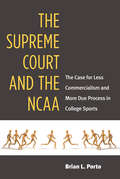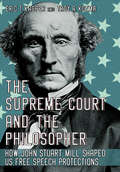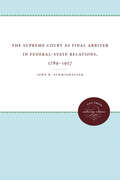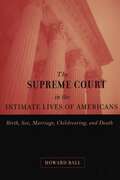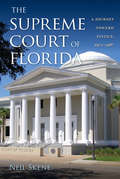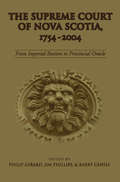- Table View
- List View
The Supreme Court Review, 2012 (Supreme Court Review)
by The University of Chicago PressFor fifty years, The Supreme Court Review has been lauded for providing authoritative discussion of the court's most significant decisions. The Review is an in-depth annual critique of the Supreme Court and its work, keeping up on the forefront of the origins, reforms, and interpretations of American law. Recent volumes have considered such issues as post-9/11 security, the 2000 presidential election, cross-burning, federalism and state sovereignty, failed Supreme Court nominations, and numerous First- and Fourth-Amendment cases.
The Supreme Court Review, 2013
by Dennis J. Hutchinson Geoffrey E. Stone David A. StraussFor fifty years, The Supreme Court Review has been lauded for providing authoritative discussion of the Court's most significant decisions. The Review is an in-depth annual critique of the Supreme Court and its work, keeping up on the forefront of the origins, reforms, and interpretations of American law. Recent volumes have considered such issues as post-9/11 security, the 2000 presidential election, cross burning, federalism and state sovereignty, failed Supreme Court nominations, the battles concerning same-sex marriage, and numerous First and Fourth amendment cases.
The Supreme Court Review, 2013 (Supreme Court Review)
by The University of Chicago PressFor fifty years, The Supreme Court Review has been lauded for providing authoritative discussion of the Court's most significant decisions. The Review is an in-depth annual critique of the Supreme Court and its work, keeping up on the forefront of the origins, reforms, and interpretations of American law. Recent volumes have considered such issues as post-9/11 security, the 2000 presidential election, cross burning, federalism and state sovereignty, failed Supreme Court nominations, the battles concerning same-sex marriage, and numerous First and Fourth amendment cases.
The Supreme Court Review, 2014 (Supreme Court Review)
by The University of Chicago PressFor more than fifty years, The Supreme Court Review has been lauded for providing authoritative discussion of the Court's most significant decisions. An in-depth annual critique of the Supreme Court and its work, The Supreme Court Review keeps at the forefront of the reforms and interpretations of American law. Recent volumes have considered such issues as post-9/11 security, the 2000 presidential election, cross burning, federalism and state sovereignty, failed Supreme Court nominations, the battles concerning same-sex marriage, and numerous First and Fourth Amendment cases.
The Supreme Court Review, 2015 (Supreme Court Review)
by The University of Chicago PressFor more than fifty years, The Supreme Court Review has won acclaim for providing a sustained and authoritative survey of the implications of the Court's most significant decisions. The Supreme Court Review is an in-depth annual critique of the Supreme Court and its work, keeping up on the forefront of the origins, reforms, and interpretations of American law. It is written by and for legal academics, judges, political scientists, journalists, historians, economists, policy planners, and sociologists.
The Supreme Court Review, 2016 (Supreme Court Review)
by The University of Chicago PressFor more than fifty years, The Supreme Court Review has won acclaim for providing a sustained and authoritative survey of the implications of the Court’s most significant decisions. The Supreme Court Review is an in-depth annual critique of the Supreme Court and its work, keeping up on the forefront of the origins, reforms, and interpretations of American law. It is written by and for legal academics, judges, political scientists, journalists, historians, economists, policy planners, and sociologists.
The Supreme Court Review, 2017 (Supreme Court Review)
by The University of Chicago PressSince it first appeared in 1960, The Supreme Court Review (SCR) has won acclaim for providing a sustained and authoritative survey of the implications of the Court's most significant decisions. SCR is an in-depth annual critique of the Supreme Court and its work, keeping up on the forefront of the origins, reforms, and interpretations of American law. SCR is written by and for legal academics, judges, political scientists, journalists, historians, economists, policy planners, and sociologists.
The Supreme Court Review, 2018 (Supreme Court Review)
by The University of Chicago PressSince it first appeared in 1960, The Supreme Court Review (SCR) has won acclaim for providing a sustained and authoritative survey of the implications of the Court's most significant decisions. SCR is an in-depth annual critique of the Supreme Court and its work, keeping up on the forefront of the origins, reforms, and interpretations of American law. SCR is written by and for legal academics, judges, political scientists, journalists, historians, economists, policy planners, and sociologists. This year’s volume features prominent scholars assessing major legal events, including: Mark Tushnet on President Trump’s “Muslim Ban” Kate Andrias on Union Fees in the Public Sector Cass R. Sunstein on Chevron without Chevron Tracey Maclin on the Fourth Amendment and Unauthorized Drivers Frederick Schauer on Precedent Pamela Karlan on Gay Equality and Racial Equality Randall Kennedy on Palmer v. Thompson Lisa Marshall Manheim and Elizabeth G. Porter on Voter Suppression Melissa Murray on Masterpiece Cakeshop Vikram David Amar on Commandeering Laura K. Donohue on Carpenter, Precedent, and Originalism Evan Caminker on Carpenter and Stability
The Supreme Court Review, 2019 (Supreme Court Review)
by The University of Chicago PressSince it first appeared in 1960, The Supreme Court Review (SCR) has won acclaim for providing a sustained and authoritative survey of the implications of the Court's most significant decisions. SCR is an in-depth annual critique of the Supreme Court and its work, keeping up on the forefront of the origins, reforms, and interpretations of American law. SCR is written by and for legal academics, judges, political scientists, journalists, historians, economists, policy planners, and sociologists. This year’s volume features incisive assessments of major legal events, including: Gillian E. Metzger on The Roberts Court's Administrative Law Paul Butler on Peremptory Strikes in Mississippi v. Flowers Nicholas O. Stephanopoulos on Partisan Gerrymandering Kent Greenfield on Hate Speech Jennifer M. Chacon on Department of Commerce v. New York Micah Schwartzman & Nelson Tebbe on Establishment Clause Appeasement William Baude on Precedent and Originalism Linda Greenhouse on The Supreme Court’s Challenge to Civil Society James T. Kloppenberg on James Madison
The Supreme Court Review, 2022 (Supreme Court Review)
by The University of Chicago PressAn annual peer-reviewed law journal covering the legal implications of decisions by the Supreme Court of the United States. Since it first appeared in 1960, the Supreme Court Review has won acclaim for providing a sustained and authoritative survey of the implications of the Court's most significant decisions. SCR is an in-depth annual critique of the Supreme Court and its work, analyzing the origins, reforms, and modern interpretations of American law. SCR is written by and for legal academics, judges, political scientists, journalists, historians, economists, policy planners, and sociologists.
The Supreme Court Review, 2023 (Supreme Court Review #2023)
by The University of Chicago PressAn annual peer-reviewed law journal covering the legal implications of decisions by the Supreme Court of the United States. Since it first appeared in 1960, the Supreme Court Review (SCR) has won acclaim for providing a sustained and authoritative survey of the implications of the Court’s most significant decisions. SCR is an in-depth annual critique of the Supreme Court and its work, analyzing the origins, reforms, and modern interpretations of American law. SCR is written by and for legal academics, judges, political scientists, journalists, historians, economists, policy planners, and sociologists.
The Supreme Court and Benign Elite Democracy in Japan
by Hiroshi ItohThe Constitution of Japan has served the country for more than half a century, creating and maintaining a stable and functional democratic system. This book innovatively interprets Japanese politics as a ’benign elite democracy’ whilst demonstrating the Supreme Court's vital contribution to the political structure. In The Supreme Court and Benign Elite Democracy in Japan, Hiroshi Itoh presents the first empirical study of judicial decision making under Japan's Constitution. He examines the Supreme Court’s records regarding the protection of civil rights and liberties, the preservation of the conformity of lower levels of laws and regulations to the Constitution, and the maintenance of the Court's relationships to the political branches. The analysis of these three aspects of constitutional litigation reveal how the Supreme Court contributes to the efficacy of constitutional democracy by keeping the system adaptable to the ever-changing environment in and around Japan.
The Supreme Court and Constitutional Democracy
by John AgrestoIn The Supreme Court and Constitutional Democracy John Agresto traces the development of American judicial power, paying close attention to what he views as the very real threat of judicial supremacy. Agresto examines the role of the judiciary in a democratic society and discusses the proper place of congressional power in constitutional issues. Agresto argues that while the separation of congressional and judicial functions is a fundamental tenet of American government, the present system is not effective in maintaining an appropriate balance of power. He shows that continued judicial expansion, especially into the realm of public policy, might have severe consequences for America's national life and direction, and offers practical recommendations for safeguarding against an increasingly powerful Supreme Court. John Agresto's controversial argument, set in the context of a historical and theoretical inquiry, will be of great interest to scholars and students in political science and law, especially American constitutional law and political theory. 02 In The Supreme Court and Constitutional Democracy John Agresto traces the development of American judicial power, paying close attention to what he views as the very real threat of judicial supremacy. Agresto examines the role of the judiciary in a... In The Supreme Court and Constitutional Democracy John Agresto traces the development of American judicial power, paying close attention to what he views as the very real threat of judicial supremacy. Agresto examines the role of the judiciary in a democratic society and discusses the proper place of congressional power in constitutional issues. Agresto argues that while the separation of congressional and judicial functions is a fundamental tenet of American government, the present system is not effective in maintaining an appropriate balance of power. He shows that continued judicial expansion, especially into the realm of public policy, might have severe consequences for America's national life and direction, and offers practical recommendations for safeguarding against an increasingly powerful Supreme Court. John Agresto's controversial argument, set in the context of a historical and theoretical inquiry, will be of great interest to scholars and students in political science and law, especially American constitutional law and political theory. 02 In The Supreme Court and Constitutional Democracy John Agresto traces the development of American judicial power, paying close attention to what he views as the very real threat of judicial supremacy. Agresto examines the role of the judiciary in a... In The Supreme Court and Constitutional Democracy John Agresto traces the development of American judicial power, paying close attention to what he views as the very real threat of judicial supremacy. Agresto examines the role of the judiciary in a democratic society and discusses the proper place of congressional power in constitutional issues. Agresto argues that while the separation of congressional and judicial functions is a fundamental tenet of American government, the present system is not effective in maintaining an appropriate balance of power. He shows that continued judicial expansion, especially into the realm of public policy, might have severe consequences for America's national life and direction, and offers practical recommendations for safeguarding against an increasingly powerful Supreme Court. John Agresto's controversial argument, set in the context of a historical and theoretical inquiry, will be of great interest to scholars and students in political science and law, especially American constitutional law and political theory. 02 In The Supreme Court and Constitutional Democracy John Agresto traces the development of American judicial power, paying close attention to what he views as the very real threat of judicial supremacy. Agresto examines the role of the judiciary in a...
The Supreme Court and Election Law: Judging Equality from Baker v. Carr to Bush v. Gore
by Richard Hasen&“A pioneering study of the Court&’s increasing efforts to regulate the US political system&” from the author of A Real Right to Vote (Bruce Cain, University of California, Berkeley). In the first comprehensive study of election law since the Supreme Court decided Bush v. Gore, Richard L. Hasen rethinks the Court&’s role in regulating elections. Drawing on the case files of the Warren, Burger, and Rehnquist courts, Hasen roots the Court&’s intervention in political process cases to the landmark 1962 case, Baker v. Carr. The case opened the courts to a variety of election law disputes, to the point that the courts now control and direct major aspects of the American electoral process. The Supreme Court does have a crucial role to play in protecting a socially constructed &“core&” of political equality principles, contends Hasen, but it should leave contested questions of political equality to the political process itself. Under this standard, many of the Court&’s most important election law cases from Baker to Bush have been wrongly decided. &“A must-read for anyone interested in the intersection of law and politics . . . [Hasen&’s] is an important framework against which election law scholars will react and upon which they will build for some time to come.&” —Michigan Law Review &“Hasen engagingly draws on internal Court deliberations, as well as political science and legal theory, to assess and criticize dramatic transformations in the role of constitutional law in overseeing the structure of democracy.&” —Richard H. Pildes, NYU School of Law &“A major contribution to the field of election law.&” —Thomas E. Mann, The Brookings Institution
The Supreme Court and Legal Change
by Lee Epstein Joseph F. KobylkaThe authors analyze abortion and death penalty decisions by the Supreme Court and argue that they provide prime examples of abrupt legal change. After proposing that the strength of legal arguments has at least as much impact on Court decisions as do public opinion and justices' political beliefs, they focus on the way litigators propel certain issues onto the Court's agenda and seek to persuade the justices to affect legal change.
The Supreme Court and Religion in American Life, Vol. 1: The Odyssey of the Religion Clauses (New Forum Books #33)
by James HitchcockSchool vouchers. The Pledge of Allegiance. The ban on government grants for theology students. The abundance of church and state issues brought before the Supreme Court in recent years underscores an incontrovertible truth in the American legal system: the relationship between the state and religion in this country is still fluid and changing. This, the first of two volumes by historian and legal scholar James Hitchcock, provides the first comprehensive exploration of the Supreme Court's approach to religion, offering a close look at every case, including some that scholars have ignored. Hitchcock traces the history of the way the Court has rendered important decisions involving religious liberty. Prior to World War II it issued relatively few decisions interpreting the Religious Clauses of the Constitution. Nonetheless, it addressed some very important ideas, including the 1819 Dartmouth College case, which protected private religious education from state control, and the Mormon polygamy cases, which established the principle that religious liberty was restricted by the perceived good of society. It was not until the 1940s that a revolutionary change occurred in the way the Supreme Court viewed religion. During that era, the Court steadily expanded the scope of religious liberty to include many things that were probably not intended by the framers of the Constitution, and it narrowed the permissible scope of religion in public life, barring most kinds of public aid to religious schools and forbidding almost all forms of religious expression in the public schools. This book, along with its companion volume, From "Higher Law" to "Sectarian Scruples," offers a fresh analysis of the Court's most important decisions in constitutional doctrine. Sweeping in range, it paints a detailed picture of the changing relationship between religion and the state in American history.
The Supreme Court and Religion in American Life, Vol. 2: From "Higher Law" to "Sectarian Scruples" (New Forum Books #34)
by James HitchcockSchool vouchers. The Pledge of Allegiance. The ban on government grants for theology students. The abundance of church and state issues brought before the Supreme Court in recent years underscores an incontrovertible truth in the American legal system: the relationship between the state and religion in this country is still fluid and changing. This, the second of two volumes by historian and legal scholar James Hitchcock, offers a complete analysis and interpretation of the Court's historical understanding of religion, explaining the revolutionary change that occurred in the 1940s. In Volume I: The Odyssey of the Religion Clauses (Princeton), Hitchcock provides the first comprehensive survey of the court cases involving the Religion Clauses, including a number that scholars have ignored. Here, Hitchcock examines how, in the early history of our country, a strict separation of church and state was sustained through the opinions of Jefferson and Madison, even though their views were those of the minority. Despite the Founding Fathers' ideas, the American polity evolved on the assumption that religion was necessary to a healthy society, and cooperation between religion and government was assumed. This view was seldom questioned until the 1940s, notes Hitchcock. Then, with the beginning of the New Deal and the appointment of justices who believed they had the freedom to apply the Constitution in new ways, the judicial climate changed. Hitchcock reveals the personal histories of these justices and describes how the nucleus of the Court after World War II was composed of men who were alienated from their own faiths and who looked at religious belief as irrational, divisive, and potentially dangerous, assumptions that became enshrined in the modern jurisprudence of the Religion Clauses. He goes on to offer a fascinating look at how the modern Court continues to grapple with the question of whether traditional religious liberty is to be upheld.
The Supreme Court and The NCAA: The Case for Less Commercialism and More Due Process in College Sports
by Porto Brian L.Two Supreme Court decisions,NCAA v. Board of Regents(1984) andNCAA v. Tarkanian(1988), have shaped college sports by permitting the emergence of a supercharged commercial enterprise with high financial stakes for institutions and individuals, while failing to guarantee adequate procedural protections for persons charged with wrongdoing within that enterprise. Brian L. Porto examines the conditions that led to the cases, the reasoning behind the justices' rulings, and the consequences of those rulings. Arguing that commercialized college sports should be compatible with the goals of higher education and fair to all participants, Porto suggests that the remedy is a federal statute. His proposed College Sports Legal Reform Act would grant the NCAA a limited "educational exemption" from the antitrust laws, enabling it to enhance academic opportunities for athletes. The Act would also afford greater procedural protections to accused parties in NCAA disciplinary proceedings. Porto's prescription for reform in college sports makes a significant contribution to the debate about how best to address perennial problems in college sports such as cost containment, access to a meaningful education for athletes, and fairness in rule enforcement.
The Supreme Court and the Attitudinal Model Revisited
by Jeffrey A. Segal Harold J. SpaethThis book, authored by two leading scholars of the Supreme Court and its policy making, systematically presents and validates the use of the attitudinal model to explain and predict Supreme Court decision making. In the process, it critiques the two major alternative models of Supreme Court decision making and their major variants: the legal and rational choice. Using the US Supreme Court Data Base, the justices' private papers, and other sources of information, the book analyzes the appointment process, certiorari, the decision on the merits, opinion assignments, and the formation of opinion coalitions. The book will be the definitive presentation of the attitudinal model as well as an authoritative critique of the legal and rational choice models. The book thoroughly reflects research done since the 1993 publication of its predecessor, as well as decisions and developments in the Supreme Court, including the momentous decision of Bush v. Gore.
The Supreme Court and the Philosopher: How John Stuart Mill Shaped US Free Speech Protections
by Eric T. Kasper Troy A. KozmaThe Supreme Court and the Philosopher illustrates how the modern US Supreme Court has increasingly adopted a view of the constitutional right to the freedom of expression that is classically liberal in nature, reflecting John Stuart Mill's reasoning in On Liberty. A landmark treatise outlining the merits of limiting governmental and social power over the individual, On Liberty advocates for a maximum protection of human freedom. Proceeding case by case and covering a wide array of issues, such as campaign finance, offensive speech, symbolic speech, commercial speech, online expression, and false statements, Eric T. Kasper and Troy A. Kozma show how the Supreme Court justices have struck down numerous laws for infringing on the freedom of expression.Kasper and Kozma demonstrate how the adoption of Mill's version of free speech began with Justice Oliver Wendell Holmes Jr. more than a century ago and expanded over time to become the prevailing position of the Court today. The authors argue that this embrace of Mill's rationale has led to an unmistakable reorientation in the Court's understanding of free expression jurisprudence.The Supreme Court and the Philosopher is the first book to comprehensively explore how the political philosophy of Mill has influenced the highest court in the land. In targeting the underlying philosophical reasons that explain why the modern Supreme Court renders its First Amendment decisions, this book is particularly timely, as the issues of censorship and freedom of expression are debated in the public square today.
The Supreme Court as Final Arbiter in Federal-State Relations, 1789-1957
by John R. SchmidhauserIn analyzing the Supreme Court's powers in federal-state relations, the author demonstrates that the framers of the constitution clearly intended that the Court should be the federal umpire, thus disproving a charge by modern states' righters of usurpation of power by the Supreme Court. In each historical period the effect of the Court interpretations on the autonomy of the state governments and on the acceleration of federal centralization is considered.Originally published in 1958.A UNC Press Enduring Edition -- UNC Press Enduring Editions use the latest in digital technology to make available again books from our distinguished backlist that were previously out of print. These editions are published unaltered from the original, and are presented in affordable paperback formats, bringing readers both historical and cultural value.
The Supreme Court in the Intimate Lives of Americans: Birth, Sex, Marriage, Childrearing, and Death
by Howard BallPersonal rights, such as the right to procreate--or not-- and the right to die generate dendless debate. Howard Ball shows how the Supreme Court has grappled with the right to reproduce and abort, and takes on the issue of auto-euthanasia and assisted suicide, from Karen Ann Quinlan through Kevorkian and just recently to the Florida case of the women who was paralyzed by a gunshot from her mother and who had pulled the plug on herself. For the last half of the twentieth century, the justices of the Supreme Court have had to wrestle with new and difficult life and death questions for them as well as for doctors and their patients, medical ethicists, sociologists, medical practitioners, clergy, philosophers, law makers and judges. This book offers a look at these issues as they emerged and examines the manner in which the men and women of the U.S Supreme Court adressed them.
The Supreme Court in the Intimate Lives of Americans: Birth, Sex, Marriage, Childrearing, and Death
by Howard BallChoice Outstanding Academic Title 2003 Personal rights, such as the right to procreate-or not-and the right to die generate endless debate. This book maps out the legal, political, and ethical issues swirling around personal rights. Howard Ball shows how the Supreme Court has grappled with the right to reproduce and to abort, and takes on the issue of auto-euthanasia and assisted suicide, from Karen Ann Quinlan through Kevorkian and just recently to the Florida case of the woman who was paralyzed by a gunshot from her mother and who had the plug pulled on herself. For the last half of the twentieth century, the justices of the Supreme Court have had to wrestle with new and difficult life and death questions for them as well as for doctors and their patients, medical ethicists, sociologists, medical practitioners, clergy, philosophers, law makers, and judges. The Supreme Court in the Intimate Lives of Americans offers a look at these issues as they emerged and examines the manner in which the men and women of the U.S. Supreme Court addressed them.
The Supreme Court of Florida: A Journey toward Justice, 1972-1987
by Neil Skene“A fascinating judicial study. The importance of the modern high court’s docket is so thoroughly and expertly chronicled in this book: reapportionment, courtroom cameras, personal injury, family law, environmental law, capital punishment, criminal justice, and equal justice under law.”—Thomas E. Baker, coauthor of Appellate Courts: Structures, Functions, Processes, and Personnel “A highly readable portrait of a crucial time in the history of the state high court. It brings to life the jurists and lawyers who contributed so much to contemporary Florida law.”—Mary Ziegler, author of After Roe: The Lost History of the Abortion Debate “A richly sourced, thoroughly researched, and entertaining account of one of the most significant eras in the history of what is arguably the most important (and least reported) branch of Florida government. Tells not only how the court’s decisions impact people’s lives but also how the personalities and life experience of new justices lead to evolutions in the law.”—Martin A. Dyckman, author of A Most Disorderly Court: Scandal and Reform in the Florida Judiciary “Necessary reading for anyone interested in law and politics in Florida. Makes historical figures come alive.”—Jon L. Mills, author of Privacy in the New Media Age This third volume in the history of the Florida Supreme Court describes the court during its most tumultuous years. Amid the upheaval of the civil rights movement, the Vietnam War, and Watergate, the story begins with reform in the Florida court system. It includes the court’s first black justice, Joseph Hatchett; Governor Reubin Askew’s new system for merit selection of justices; and revision of Article V, the section of the state constitution dealing with the judiciary. Neil Skene details landmark court decisions; the introduction of cameras in court; changes to media law, personal injury law, and family and divorce law; privacy rights; gay rights; death penalty cases; and the appointment of the first female justice, Rosemary Barkett. Shining a light on the often invisible work that informs the law, Skene recognizes lawyers and lower-court judges whose arguments and opinions have shaped court rulings. He integrates firsthand stories from justices with documents, articles, and cases. The result is an absorbing portrayal of a judicial institution adapting to a turbulent time of deep political and social change.
The Supreme Court of Nova Scotia, 1754-2004
by Barry Cahill Philip Girard Jim PhillipsPrepared to coincide with the 250th anniversary of the establishment of Nova Scotia's Supreme Court, this important new volume provides a comprehensive history of the institution, Canada's oldest common law court. The thirteen essays include an account of the first meeting in 1754 of the court in Michaelmas Term, surveys of jurisprudence (the court's early federalism cases; its use of American law; attitudes to the administrative state), and chapters on the courts of Westminster Hall, on which the Supreme Court was modelled, and the various courthouses it has occupied. Anchoring the volume are two longer chapters, one on the pre-confederation period and one on the modern period.Editors Philip Girard, Jim Phillips, and Barry Cahill have put together the first complete history of any Canadian provincial superior court. All of the essays are original, and many offer new interpretations of familiar themes in Canadian legal history. They take the reader through the establishment of the one-judge court to the present day ? a unique contribution to our understanding of superior courts.
